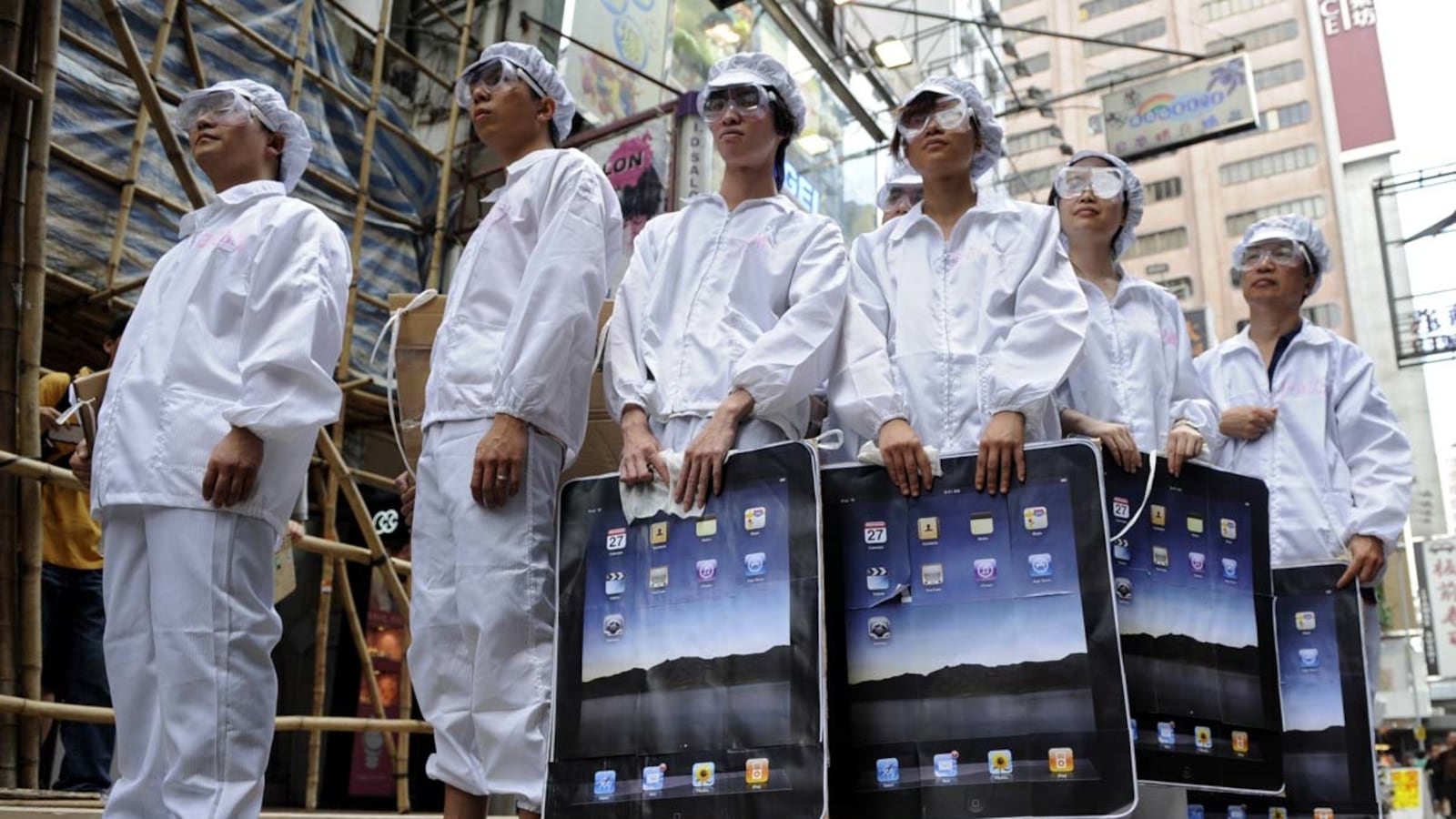What a dizzying week it has been for Apple shareholders. (Full disclosure: I am one of them.) Its share price has soared from bushels of bullish earnings, with a $13.06 billion profit—for just its fiscal first quarter. It sold 37 million iPhones and 15.4 million iPads over the holidays, doubling its performance from the same period last year.
Coinciding with the giddy news of Apple gadgets booting up and blinking all over the world was a disturbing report from The New York Times detailing the human cost of producing all those iPhones and iPads—not here in America, but in China. These costs, borne by laborers in industrial cities such as Chengdu, are off the books, so to speak, since they occur in factories owned not by Apple but by its manufacturers—the vast supply chain that assembles and shines all of its products. There have been explosions and deaths at a few of these factories. And many of the workers, allegedly, are subject to hazardous and brutal workplace environments without proper safety protections.
Apple has audited many of its suppliers and said it found violations of its own code of conduct, which it created specifically to ensure that “the working conditions in Apple’s supply chain are safe, [and] that workers are treated with respect and dignity.” To its credit, Apple has inspected hundreds of facilities (more so than most other tech companies), and claims that when violations are found, it insists on improvements.
Only a few short months since the death of its founder and impresario, Steve Jobs, Apple appears more dominant than ever. It remains the darling of the digital age, envied for its innovations and balance sheet. But it now appears that these wizards from Cupertino have a few skeletons in the closet in China. There lurks the dark side of all these pretty inventions. (To be sure, many of the leading technology companies face the same ethical challenges, since they all manufacture in China.)

Surely we shouldn’t be surprised by this despairing news. The success story that is Apple is not just one of innovation and design. It is also one of execution. Apple’s rush to market, its ability to deliver the most glittering gadgets the world has ever seen is as much a triumph of manufacturing as anything else. Woe to the company that can’t get its products into the stores on time, or can’t stay ahead of the curve by continually reinventing the wheel. (See RIM and Motorola). The snaking line of urban campers that routinely gather outside of those megachurches called Apple Stores all want the magnificent and the new, but they never ask: “How did Apple get it into my hands so fast?”
Let us not forget that amid all the testimonials surrounding Jobs’s death was the somewhat oblique revelation that while he may have been one of the world’s great visionaries, he wasn’t one of its most charitable. Despite his billions in net worth, he lived a relatively modest life, and his charitable giving was almost nonexistent—surely when compared with his friend and fellow high-tech baron, Bill Gates, who is now seemingly in the wealth-disposal business.
In the same Times series on Apple, there was also this article about the loss of middle-class jobs to China due to its superior manufacturing prowess. It seems that 8,000 workers can be roused from their dormitories within 30 minutes to begin 12-hour shifts fitting glass screens on iPhones—with a biscuit and a cup of tea. Thomas Friedman noted the same anecdote in his column, as an example of American weakness. What’s the takeaway: are we to emulate China, or pity them?
Apple shareholders and aficionados are now faced with a moral dilemma—revel in the company’s stock price and whisper sweet words of indifference to Siri, the virtual personal assistant in the iPhone4S, all the while remaining silent about the grim workplace conditions of Apple’s suppliers? Yet, Apple has committed no crime. They have no legal liability for what happens in Chinese factories that covet its manufacturing business.
Besides, we negotiate these moral concessions all the time when it comes to the worlds of business and law. We never confuse morality and ethical behavior, good manners and common decency, with the bottom line, zero-sum aspirations of getting ahead and staying ahead. There is a clear separation in what is legally correct from what is morally right. And this division radiates even further into the broader culture by separating our private and moral spheres or existence from our professional and public ones.
Whatever happens during the workday is considered fair game. “It’s business, not personal”—a signature, often quoted line from The Godfather, which was both parodied and reexamined in You’ve Got Mail. Actions that take place between the hours of 9 to 5 are never subject to moral criteria. Men and women are judged, morally, by how they conduct themselves solely in their private lives. Are we faithful spouses, nurturing parents, good neighbors, loyal friends, charitable congregants? The world of the workday is immune from moral scrutiny because succeeding at business is accepted as the golden rule in the ruthless games we play at work.
We can throw stones at Apple. So many of its products are covered in glass, after all. Maybe it is doing all it can balancing a moral dilemma with an onerous mandate: to satisfy consumer and shareholder demand and live up to the equally demanding legacy of its founder, while also being mindful of the working conditions of those who labor to assemble its glistening jewels of the modern age.
But the larger problem exists in our unwillingness to apply a moral mandate to all of our jobs, not just the company that Jobs built.





